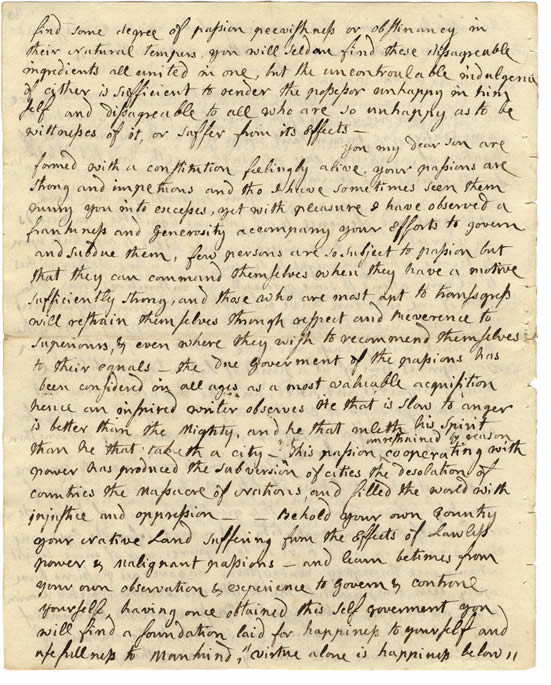find
some degree of passion, peevishness or obstinancy in their Natural tempers.
You will seldom find these dissagreable ingredients all united in one, but
the uncontroulable indulgence of either is sufficient to render the possessor
unhappy in himself and disagreeable to all who are so unhappy as to be wittnesses
of it, or suffer from its Effects.
You
my dear son are formed with a constitution feelingly alive, your passions
are strong and impetuous and tho I have sometimes seen them hurry you into
excesses, yet with pleasure I have observed a frankness and Generosity accompany
your Efforts to govern and subdue them. Few persons are so subject to passion
but that they can command themselves when they have a motive sufficiently
strong, and those who are most apt to transgress will restrain themselves
through respect and Reverences to Superiours, and even where they wish to
recommend themselves to their equals. The due Government of the passions
has been considered in all ages as a most valuable acquisition, hence an
inspired writer observes, He that is slow to anger is better than the Mighty,
and he that ruleth his Spirit than he that taketh a city. This passion unrestrained
by reason cooperating with power has produced the Subversion of cities,
the desolation of countries, the Massacre of Nations, and filled the world
with injustice and oppression.—Behold your own Country, your Native
Land suffering from the Effects of Lawless power and Malignant passions,
and learn betimes from your own observation and experience to govern and
controul yourself. Having once obtained this self government you will find
a foundation laid for happiness to yourself and usefullness to Mankind.
"Virtue alone is happiness below,"
Adams,
Abigail. Letter to John Quincy Adams, March 20, 1780. Adams Family Papers,
Massachusetts Historical Society. Published in Adams Family Correspondence,
Volume 3: April 1778 - September 1780 (Cambridge: The Belknap Press of Harvard
University Press, 1973). Pages 310-313.



